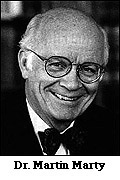
|
Serving as a starting point for Martin Marty's Public Religion Project, the one-day symposium assembled 100 Minnesotans from many different backgrounds and areas of expertise to discuss religion's place in public life.
Everyday Life
Throughout April, 1998, MPR aired programming and sponsoring events
about the role of religion in our lives and community. The Public Religion
Symposium produced by MPR's Civic Journalism Initiative on April 28 was part of this focus.
|
THE FIRST RESPONSE FROM MOST people when we mention our project is, "What do you mean by Public Religion?" The answer ties in our mission statement:
The Public Religion Project exists to promote efforts to bring to light and interpret the forces of faith within a pluralistic society.
From this description of what we are about, we lift up a number of terms. First, we are promoting efforts. It is not the task of the Project to promote religion.
None of the parties involved would have put energies into this subject if they did not have some positive views of the potential of religion to enhance public life - just as, of course, they also have some regard for the negative potential of religion. But the Project is not a public relations agency or activity. It reports on and engages in criticism of religious voices and energies where that seems to be in place. No denominational or ecumenical agency has asked us to represent it and we are beholden to none.
We exist to bring to light the forces of faith. Bringing to light implies that there has been darkness, or at least shadows. We have not joined those who complain about a total absence of religion in a society gone secular; we believe that they misrepresent American public life. A "pluralistic society" offers a bewildering array of competing religious voices mingled with the noises and echoes of nonreligious claimants to public attention. We agree with ethicist William May of Southern Methodist University: America "reeks of religion." The connotations of "reeking" are largely negative, suggesting unpleasantness. The national atmosphere may as well carry pleasant aromas caused by religious endeavors. But either way, "reeks" and "aromas" are hard to grasp and define. In many ways, in a society where religion is not an official establishment, it is "everywhere but nowhere." For those reasons, among others, it is often apparently shadowed and in need of being "brought to light."
Continuing to unfold terms in the Project's mission, we promote efforts to interpret the forces of faith. To mention interpretation is to open the scene for intense debates. Ours is often described as a "hermeneutically preoccupied" era, especially in respect to texts regarded as sacred. This means, among other things, that no one can expound ideas, texts, or events involving the sacred without raising legitimate suspicion. Questions of power and viewpoint come into play at once. Who are The Pew Charitable Trusts and University of Chicago, these directors, editors and researchers, that they should be authorized or encouraged to interpret religious forces or to interpret the interpreters? Furthermore, there are hundreds of religious groups in America. Who can know about them all or be objective in appraising their case? Who can be neutral, especially if they themselves list "interpreting" as part of their work?
Aware of such questions and what they imply, we make every effort to be - to use an under-used word - disinterested. Whatever our own convictions, if we are perceived as favoring ideologies of right or left (or center!), the interpretations cannot be of much use to the public and to leaders. We believe with the late John Courtney Murray, S.J., that a republic is made up of people "locked in civil argument." The more interpreters, the better; the better the interpreters, the more civil life will benefit.
The guiding statement goes on to say that the above efforts give attention to the forces of faith. The concept of faith is notoriously difficult to define and isolate; it is full of ambiguity and its expressions are complex. Forces of faith can or could mean those of an individual, with faith here representing the basic trust, the root philosophy, the most profound commitments of an individual who "has faith." It can and does also mean denominations, congregations, academies, voluntary agencies, publishers, and entrepreneurial groups; in every case, they set out to be "forces," to express power and interest. As such, they merit attention in society.
The society is here described as pluralistic. The adjective is stressed in connection with the society to indicate that late-modern American life yields to no single force of faith, be it Catholicism, secular humanism, or evangelicalism, however much any of these or others might dream of dominating. The United States republic's "rules of the game" assures that "any number can play," that the playing fields should be level, and that each makes its own way.
To recall a word of Voltaire cherished by James Madison in the early days of the American republic: If a nation has one religion, it would characteristically persecute all others. If it had two, they would war against each other. Where it has many, as it did already in England at the time of Voltaire, they had to find ways to get along. The Public Religion Project is interested in what North Americans do with their many "forces of faith" as they seek to do justice to commitments of the spirit in the body politic.